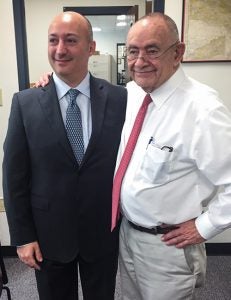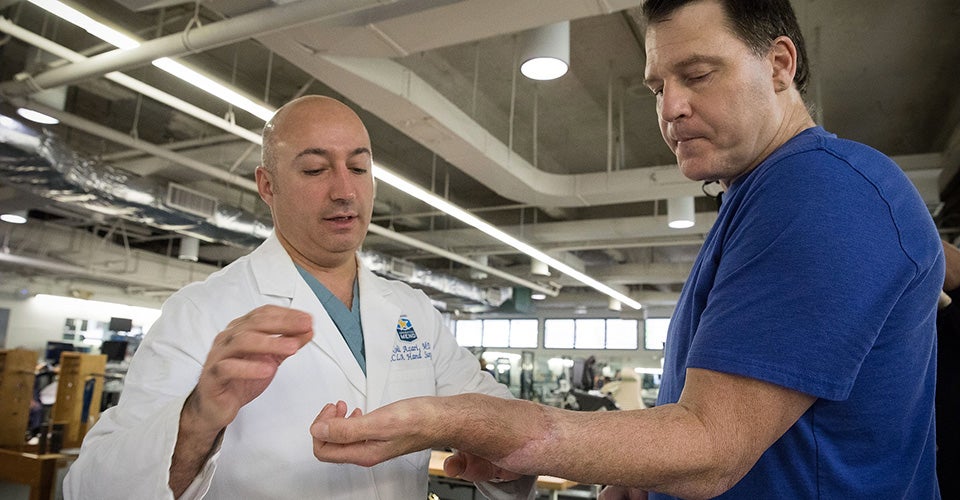A FITTING START
World-renowned hand transplant surgeon credits ECU for shaping his career
During the past few months, East Carolina University alumnus Dr. Kodi Azari has received national attention for the successful hand transplantation he performed on Hollywood executive Jonathan Koch.
Due to a mysterious and near-deadly illness more than two years ago, Koch lost part of his right leg, most of the fingers on his right hand and his entire left hand. But thanks to a donor and Azari’s transplant team at UCLA, Koch received a new hand in October. His story was recently featured on ABC’s “Nightline” and documented in Los Angeles Magazine.
The procedure offers much promise for the future of hand transplant surgery.
“I chose the specialty of hand surgery and plastic surgery actually at East Carolina,” Azari said during a recent visit to ECU’s Brody School of Medicine, where he reconnected with mentors and spoke with surgery residents and medical students interested in surgery careers. “When I was in the gross anatomy lab and when we did dissections of the hand, it was the most incredible feat of engineering that I had ever seen.
Azari is a hand surgeon, microvascular surgeon and reconstructive plastic surgeon. He serves as the chief of reconstructive transplantation in UCLA’s Department of Surgery. He’s also medical co-director of Operation Mend, a UCLA Health System program aimed at providing complex reconstructive surgery and psychological support free of charge to wounded service members.
He’s been a lead surgeon on multiple hand transplantation operations, including the first double-hand transplantation and the first arm transplantation performed in the U.S.
Azari earned his medical degree at ECU in 1997 before going on to general and plastic surgery residencies at the University of Pittsburgh Medical Center, a tissue-engineering fellowship at Carnegie Mellon University, and a hand and microsurgery fellowship at UCLA. His recent trip to Greenville was the first in 20 years.
“When I was a student here [at ECU], hand transplantations were a dream,” he told a group of medical students. “At that time, it was something that was thought of, but nobody had been doing them. So that became my dream to be able to do something like that. I devoted the next many years to become that expert in the field, to be able to do these procedures.”

Azari (left) poses with another one of his mentors, ECU’s Dr. Walter Pories. (Contributed photo)
Azari was born in London and spent part of his childhood in Iran before his family settled in Connecticut. He said he chose ECU’s medical school because of its affordability.
“I got a first-rate education that was an absolute bargain,” he said. “I don’t think this exists anywhere else – the education and also the price. A lot of my colleagues are graduating $250,000, $500,000 in debt, and when I went here, it was $3,000 a year for tuition and fees… Now I look at it, this is a world-class medical institution. I don’t think you can beat this.”
He credits his mentors at ECU for helping shape him into the physician and person he is today, especially Dr. Robert Lust, chair of physiology.
“I have three people that I remember quite fondly, and number one is Bob Lust, who took me under his wings. Really the majority of my success if I’ve ever had any is because he helped me in my early stages.
“The two others were Dr. Ranny Chitwood and Dr. Walter Pories,” Azari continued. “I learned from Dr. Chitwood to lead by example and outwork everybody, and then you can achieve whatever you want to do. And with Dr. Pories, I learned that you treat everybody the same, whether it’s the lowest man on the totem pole or the highest man on the totem pole; they’re all human beings and you treat them all with the same degree of respect.”
Medical student Gabriel Gaweda, who also considers Lust a mentor, was encouraged by Azari’s visit.
“It’s pretty nice having doctors who sat in the same seat that I get to sit in – same classrooms, same professors,” Gaweda said. “It’s very motivating and inspiring to know that success is on the horizon for us.”
Other students commented on Azari’s humility and care for his patients –attributes they feel are prioritized at Brody today.
“Whatever field you go into, people know you came from Brody based on your actions and how you treat patients,” said medical student John Hurley. “It doesn’t matter where you wind up or where you go – San Francisco; L.A.; Beaufort, North Carolina – you’re still going to be focused on the patient and you’re still going to have the heart of Brody with you.”
Azari said the biggest lesson he hoped students would take away from his visit is this: “You have been to the greatest place that you can go to, and you have been given the tools; the rest of it is up to you. It’s just with hard work and being a good person, there’s nothing they can’t achieve.”

Dr. Azari (left) takes a look at Johnathan Koch’s transplanted hand. (Photo courtesy of UCLA Health)